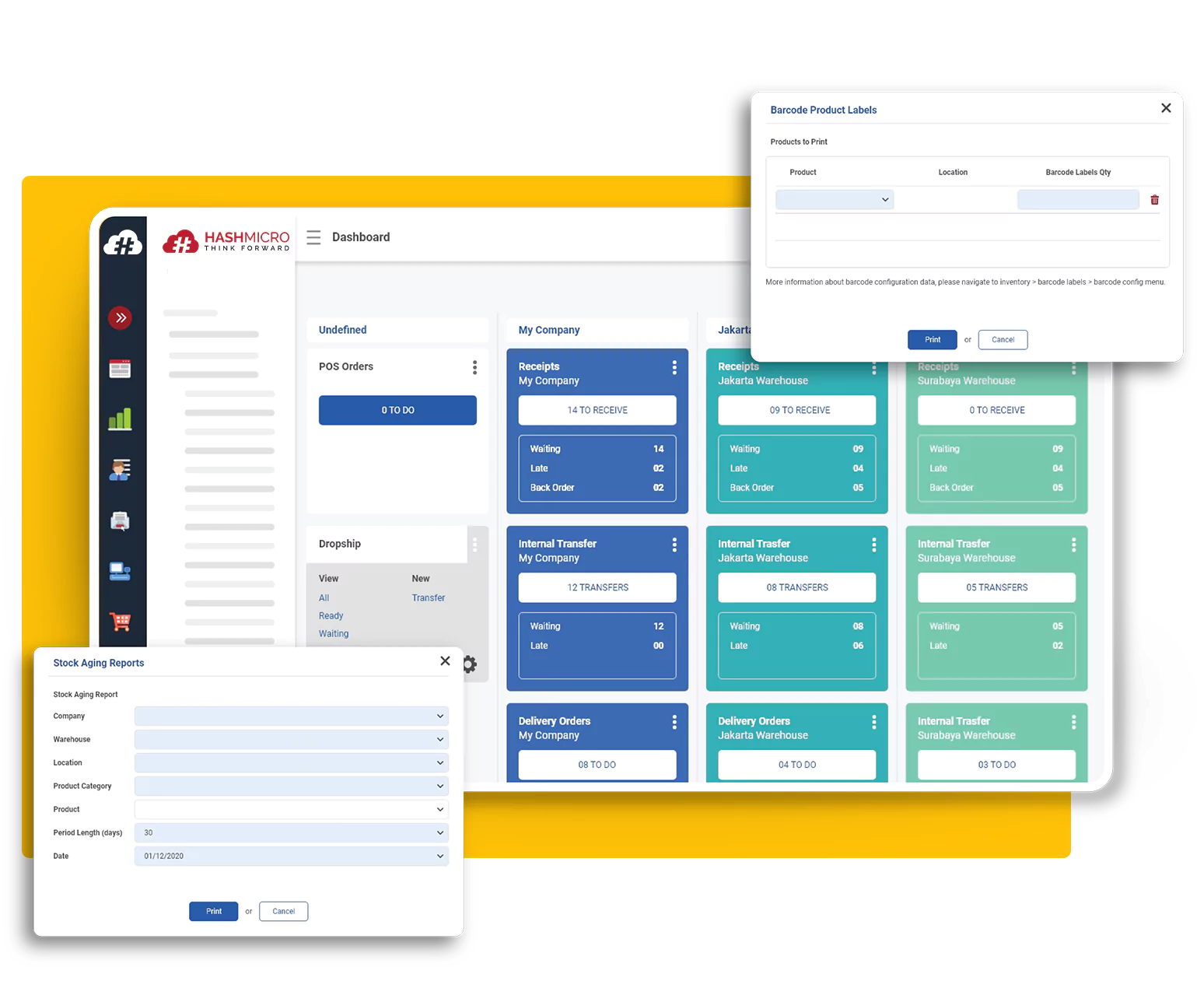Did you know that 65% of eCommerce businesses in Singapore focus on efficient inventory management?
In eCommerce, quick and efficient service is vital. To lead, you need top-notch systems and tools. Here’s where the warehouse management system shines, as it helps improve inventory handling, order fulfillment, and inventory management processes.
Choosing the right WMS software boosts an eCommerce company’s performance and customer service. This article will dive into how WMS influences eCommerce operations, and we’ll look at how selecting the right WMS solution can enhance your digital business.
Key Takeaways
|
Table of Content:
Table of Content

The Development of eCommerce Industry in 2024
In recent years, the eCommerce industry has grown a lot. This trend is set to keep going up in 2024. People are loving shopping online more, especially on their phones.
Shopping online is convenient and easy. It lets people buy things from their homes at any time. Because of this, physical stores are seeing fewer customers while online stores are booming.
In 2024, the eCommerce world will get even bigger and better. Technology will play a big role in making online shopping more enjoyable for everyone. Shopping on phones and tablets will become even more common.
Another big thing in 2024 will be giving customers a good experience no matter where they shop. People want shopping to be smooth, whether online, on an app, or in a store. Businesses need to connect all these ways of shopping to keep customers happy.
Knowing what customers like and want is key for eCommerce businesses as they need to watch trends and use data to stay on top. This helps them make their online shops better and keep growing.
The Impact of WMS Software for eCommerce Fulfillment
WMS software is crucial for many areas of eCommerce fulfillment. It adds value in several key ways, and here are some important roles of WMS software for eCommerce industry.
Robust Inventory Management
WMS software significantly enhances inventory management by providing real-time stock data, enabling eCommerce businesses to make better-informed decisions about stock levels and reorder points. This real-time insight helps prevent overstocking or stockouts, which can disrupt customer satisfaction and revenue flow. By automating inventory tracking, WMS reduces manual errors and ensures that products are where they should be in the warehouse.
Moreover, robust inventory management with WMS allows for advanced demand forecasting. By analyzing historical sales data and trends, businesses can predict future demand more accurately. This capability helps reduce inventory costs by minimizing excess stock and freeing up capital for other business needs. It also ensures that popular products are always available, improving customer satisfaction.
Order Processing and Fulfillment
WMS software streamlines order processing by automating various stages of the fulfillment process. From order routing to picking and packing, WMS helps manage the workflow, ensuring that orders are processed quickly and accurately. It can prioritize orders based on urgency, customer status, or other predefined criteria, allowing businesses to meet customer expectations for fast delivery.
Additionally, WMS can integrate with shipping carriers, enabling automated shipping label generation and tracking. This integration ensures that the correct shipping method is used, reducing shipping costs and errors. With WMS, businesses can automate communication with carriers, streamlining order fulfillment from picking to delivery. Customers benefit from quicker order processing and real-time tracking information.
Picking and Packing Optimization
WMS software uses sophisticated algorithms to optimize picking and packing processes, leading to reduced errors and faster fulfillment times. By calculating the most efficient picking routes, WMS minimizes warehouse travel time, allowing workers to complete tasks more quickly. This optimized picking leads to increased productivity and reduced labor costs.
Additionally, WMS provides guidance on optimal packing methods and materials. This helps businesses reduce packaging waste, lower shipping costs, and improve sustainability. Proper packing also reduces the risk of damage during transit, resulting in fewer returns and happier customers. With WMS, businesses can improve both operational efficiency and customer satisfaction through streamlined picking and packing.
Location Management
WMS simplifies location management by organizing the warehouse based on product demand and other criteria. By designating specific locations for different types of products, WMS ensures that high-demand items are easily accessible, reducing the time it takes to locate and pick products. This strategic location management helps maintain a smooth and efficient warehouse workflow.
Moreover, WMS supports various picking strategies like zone picking, batch picking, and wave picking, each tailored to specific warehouse needs. This flexibility allows businesses to optimize their operations based on order volume, product type, and warehouse layout. By keeping a well-organized warehouse, WMS reduces confusion and errors, ultimately improving overall efficiency and order accuracy.
Shipping and Labeling
WMS plays a pivotal role in streamlining shipping and labeling processes. By automatically generating shipping labels, WMS eliminates manual errors and ensures that packages are labeled correctly. This automation speeds up the shipping process, allowing businesses to meet tight delivery deadlines. Customers benefit from timely and accurate shipping, contributing to higher satisfaction.
Furthermore, WMS tracks shipping statuses and integrates with shipping carriers to provide real-time updates. This integration enables businesses to keep customers informed about their orders, fostering trust and transparency. By automating shipping and labeling, WMS not only reduces operational costs but also enhances customer experience through reliable and efficient shipping practices.
Returns and Reverse Logistics
Handling returns and reverse logistics is more manageable with WMS software. It automates the return authorization process, allowing customers to request returns with ease and ensuring that returned items are tracked effectively. This automation speeds up the returns process, reducing the burden on customer service teams and enhancing customer satisfaction.
Additionally, WMS helps warehouses process returned items efficiently by providing workflows for inspection, restocking, and disposal. This streamlined approach to reverse logistics ensures that returned goods are processed and re-integrated into inventory promptly, reducing waste and maximizing the value of returned products.
Labor Management and Productivity
WMS software offers comprehensive labor management tools, enabling warehouse managers to monitor employee performance, allocate tasks, and track productivity. By automating these processes, WMS helps ensure that labor resources are used efficiently, reducing labor costs while maintaining high productivity levels. This capability allows managers to optimize staffing and assign tasks based on employee skills and expertise.
WMS also supports performance tracking, providing data-driven insights into employee efficiency and productivity. This information can be used to identify training needs, reward high-performing employees, and address performance issues. With WMS, warehouses can maintain a motivated and productive workforce, leading to improved operational efficiency and reduced labor costs.
Enhance Customer Experience
WMS software directly impacts customer experience by improving order accuracy and fulfillment speed. By automating order processing and integrating with shipping carriers, WMS ensures that customers receive their orders on time and in good condition. This reliability builds customer trust and enhances brand reputation, leading to increased customer retention and repeat business.
Additionally, WMS offers real-time order tracking, allowing customers to monitor the status of their orders from purchase to delivery. This transparency reduces customer anxiety and provides a better overall shopping experience.
Compliance and Security
WMS helps businesses maintain compliance with industry regulations and warehouse safety standards. By providing detailed audit trails and access controls, WMS ensures that inventory data is secure and that only authorized personnel have access to sensitive information. This level of security is crucial for protecting customer data and preventing theft or loss of inventory.
Moreover, WMS supports compliance with various safety regulations, reducing the risk of workplace accidents and injuries. By tracking inventory and providing secure access controls, WMS helps businesses maintain a safe and compliant warehouse environment. This focus on compliance and security contributes to a trustworthy and reliable eCommerce operation.
Reporting and Analytics
WMS offers comprehensive reporting and analytics tools, providing insights into warehouse operations and business performance. By tracking key metrics such as order accuracy, inventory turnover, and order cycle time, WMS helps businesses identify areas for improvement and make data-driven decisions. This capability allows managers to optimize warehouse operations and plan for future growth.
The analytical capabilities of WMS also extend to labor management and inventory forecasting. By analyzing productivity and inventory trends, businesses can better allocate resources and reduce operational costs. With detailed reports and analytics, WMS becomes an invaluable tool for strategic planning and continuous improvement in eCommerce fulfillment.
Selecting the Right WMS Software for eCommerce Success
Choosing the right warehouse management software is key for eCommerce success. With the best solution, you can make your processes smoother, boost efficiency, and improve customer satisfaction. But, the market is full of options, making the choice hard. These tips will help you pick the perfect one:
- Look at the features different WMS software offer, and see if they meet your needs. This includes how they handle inventory, process orders, pack efficiently, ship, manage returns, and make your customers happy. It’s also important to check if they keep your data safe and help you track and analyze your operations.
- Think about how well the WMS software can grow with your eCommerce business. You want software that can handle more orders, larger warehouses, and new system connections. Make sure it can keep up with your business without slowing down or losing effectiveness.
- It’s vital to make sure that the WMS software works smoothly with all your other systems. This means checking if it can easily connect with your eCommerce site, your ERP, your shipping software, and any other key tools. A system that can integrate well will ensure your operations run without a hitch and your data stays up to date.
- Consider the costs of getting and maintaining the WMS software. Look at the prices for getting started, like buying the software and setting it up. Also, think about the costs you’ll have year after year, for things like updates and support. Compare these costs to the benefits, like saving money, working more efficiently, and keeping your customers happy.
- Know how the WMS software will be rolled out and how long it will take. Make sure it can be set up when you need it. Check if the company will help train your team so the changeover goes smoothly. A trouble-free setup is vital for keeping your business on track.
- See what kind of customer support the WMS software company offers. Good support is crucial for solving problems quickly, avoiding downtime, and updating the software. Look into the company’s track record for helping customers and how they handle questions and issues.
By keeping these important factors in mind, you can find the best WMS software for your eCommerce business. The right software will help you run a more streamlined operation, work more efficiently, and provide a top-notch experience for your customers. This can lead to eCommerce success.
Conclusion
WMS software is crucial for eCommerce businesses, providing lots of advantages. It helps with managing inventory well, making orders smoother, and packaging efficiently. It also improves keeping track of where things are, the way items are shipped, and making labels.
Choosing the perfect WMS software is vital for success in eCommerce. HashMicro’s warehouse management system can be a great choice as it is the best WMS in Singapore. With comprehensive features, you can maximize the operation of your eCommerce business. Also, with complete modules available, it can be customized according to your priorities.
So, don’t wait. Get started with the right WMS software and watch your online business soar! Try the free demo of HashMicro WMS software now!


























































